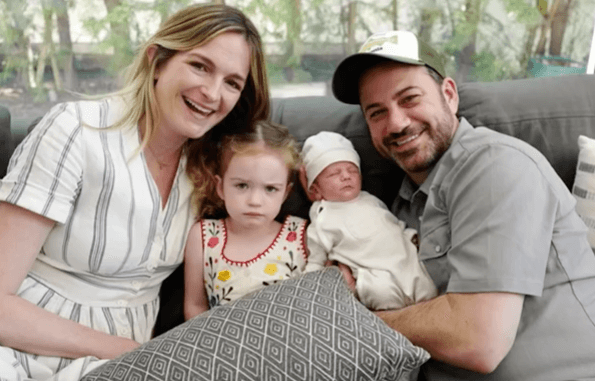Late-night host Jimmy Kimmel and his wife, Molly, survived a scare in April when their newborn son was diagnosed with a serious heart condition just hours after birth.
On May 1st, Kimmel delivered a touching, tear-soaked monologue describing his family’s harrowing experience in the minutes and hours after they learned of his son’s diagnosis.
“He appeared to be a normal, healthy baby until about three hours after he was born,” recounted Kimmel. When a nurse came in for a routine check-up, she “heard a murmur in his heart,” said Kimmel. Heart murmurs, he noted, can be commonplace in newborns.
But the nurse noticed something else that gave her pause — the skin of Kimmel’s son appeared more purplish than normal in a newborn baby.
“They determined he wasn’t getting enough oxygen in his blood,” said Kimmel. “Now all of a sudden it felt serious.”
In a matter of hours, doctors at the Children’s Hospital of Los Angeles determined that his son, William, had a condition known as tetralogy of Fallot, commonly referred to as having a hole in one’s heart.
That meant his son had to undergo an emergency operation to repair a valve and help restore proper blood flow — that led to a multi-hour, open-heart surgery for the newborn.

“It was the longest three hours of my life,” said Kimmel.
The good news is that the surgery was successful, and Kimmel and his family left the hospital after several days. But the heart condition will require additional monitoring and follow-up care.
“He’ll have to have another open-heart surgery in three to six months,” said Kimmel.
About the Heart Defect
The condition, known as tetralogy of Fallot, is actually a combination of four cardiac problems — a hole between two chambers of the heart; obstruction in blood flow between the heart and the lungs; the misplacement of a main blood vessel; and thickened muscles in a portion of the heart.
The American Heart Association (AHA) calls it “a common type of heart defect,” and national figures estimate that about five out of every 10,000 babies are born with the congenital condition.

The condition disrupts blood flow to the lungs, resulting in oxygen-depleted blood circulating through the body. As in Kimmel’s case, an initial operation is typically performed to remediate the poor blood flow, followed by a more extensive operation that aims to repair the defect entirely.
The AHA cautions that some children whose tetralogy of Fallot is not completely reversed may need to limit physical activity later in life.
Yet that’s often not the case. “If the tetralogy has been repaired with surgery, and there’s no obstruction or leak in the pulmonary valve, your child may be able to participate in normal activities without much increased risk,” according to the AHA.
With advances in treatment, many children born with the condition go on to lead normal lives. For example, the Olympic snowboarder Shaun White was born with the heart defect, but that didn’t prevent him from winning two gold medals.
Kimmel reported that his son is now home safe and “doing great.”
Richard Scott is a health care reporter focusing on health policy and public health. Richard keeps tabs on national health trends from his Philadelphia location and is an active member of the Association of Health Care Journalists.


![How To: ‘Fix’ Crepey Skin [Watch]](https://cdn.vitalupdates.com/wp-content/uploads/2017/05/bhmdad.png)












